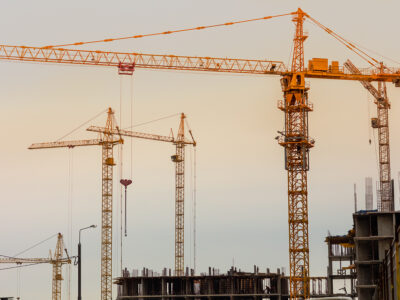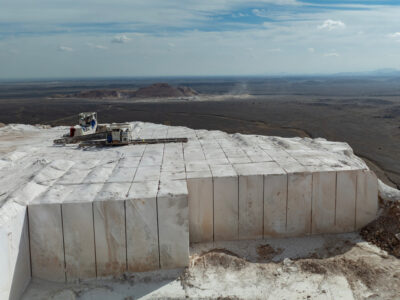Finding a woman at the helm of any construction company in the world is a rarity, let alone one in the Middle East.
But for Fatima Obaid Al Jaber, chief operating officer of the Al Jaber Group, the world of construction and all its trials and tribulations comes almost as second nature.
Al Jaber grew up alongside the growth of her father’s company, which in turn grew alongside the development of its base, Abu Dhabi. Al Jaber Group is now one of the biggest and most established companies in the region.
“I have memories of my father taking me to some of his construction sites, which seemed interesting to me. Maybe something just clicked then,” said Al Jaber.
Steering the company forward is not the only achievement Al Jaber has under her belt: after receiving a Bachelor’s degree in Architectural Engineering from the UAE University in 1987, she became a prominent figure in the public works department at Abu Dhabi Municipality.
Al Jaber held several positions within the municipality, with her last one being as assistant under-secretary for the building projects department.
I have memories of my father taking me to some of his construction sites, which seemed interesting to me.
“Working in construction, either for the government or the private sector, isn’t really any different. And as a woman, you just get used to it. There are very few women working in construction now, but you will be seeing more coming through.”
Al Jaber left the government in 2005 to join the private sector.
“It’s a good time to be in the private sector, especially with all the changes in the new government and all the developments; the government is not willing to do projects anymore, and is outsourcing them to the private sector.
“And everyday there is something new: new projects, new challenges, new people to meet – it’s not a stale business. I enjoy creating new relationships with people and exploring new ventures.”
Over the years, the Al Jaber Group, which is predominantly family-owned, has expanded to encompass the essential components critical to the success of a construction project, whether that be in the real estate, infrastructure or oil and gas sectors.
These include providing contracting, MEP, plant and building materials services, as well as logistics, landscaping and industrial development.
Around 30 subsidiaries and affiliates make up the company. Among the construction-related subsidiaries are Al Jaber Engineering and Contracting (ALEC), Al Jaber Energy Services, Al Jaber Transport and General Contracting and Al Jaber Tunnelling and Mechanical Works.
On the plant and materials supply side, the company has Xtramix Concrete Solutions, Al Jaber Aluminium Extrusions and Al Jaber Heavy Lift.
Around 70% of the company’s revenue comes from construction contracting.
“We have structured Al Jaber around four operations: contracting, manufacturing, trading and logistics. I oversee the performance of these divisions, but they have their own managing directors,” said Al Jaber.
With the pressures that come with managing a large construction company and the myriad of projects that fall under its remit, Al Jaber said the key to ensuring it all runs smoothly is good planning.
“It is tough – for men and women – especially with the speed at which the change here is happening. But you get used to living it every day. In construction, you have to plan ahead. We are very conservative with our expansion and the projects we take on; you have to plan your resources in a very clever way to overcome problems.”
Al Jaber’s focus is very much geared towards enhancing its operations and systems, along with its human resources.
“Most clients are now looking to speed up their projects. They look for the well-planned and most sophisticated contractor and consider things such as safety, quality, internal systems and cost control. So we are focusing on strengthening our resources and our internal systems so that we can help the clients to deliver.”
Al Jaber has built up an equipment fleet of around 8,000 and it is now in the process of devising a system to control the fleet.
“It will let us know how to maximise performance, how much of it is being used and how to plan for each project,” added Al Jaber.
The abundance of construction projects available across the region has led the company to be very selective about the type of work it takes on and the type of client it works with.
“I think the main challenge for all companies right now is the big growth – you cannot begin to imagine just how much work is available,” said Al Jaber.
“A contractor really has to be careful in managing this and in choosing the right contracts to take up, and with the right clients. Sometimes you choose a client just because they have the business, whereas now they’re being chosen to develop a long-term relationship with. We’re focusing on the main developers and creating a partnership with those with whom we can see more development of work in the long term, such as Aldar Properties,” she added.
Al Jaber has also witnessed a shift in the way contractors are selected for projects.
“The standard bidding process no longer happens and we don’t go for open tenders. Usually, clients ask if you’d like to negotiate a contract with them. Most developers look for reliable contractors and a long-term relationship – so, usually, if you start work on one small package, you just negotiate the other packages as they come along.”
Many developers in Abu Dhabi are now scaling back project designs, while some projects have been stopped altogether, to fall in line with Plan Abu Dhabi 2030.
The plan has been drawn up by the Executive Affairs Authority and is awaiting final approval from the Abu Dhabi government.
It involves coordinating transport networks, public amenities and other infrastructure development across the emirate.
According to Al Jaber, the move will help developers and contractors plan their projects better.
“The problem at the moment is that things aren’t integrated. Yes, we work closely with developers to be able to manoeuvre around these things, but the overall picture is unclear. I think that Plan Abu Dhabi 2030 will make things much clearer for investors and the construction industry in general, and will give us a picture about exactly what’s going to happen in Abu Dhabi over the next 30 years.”




